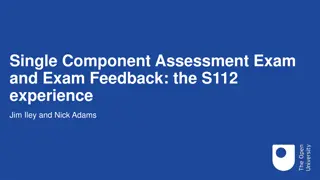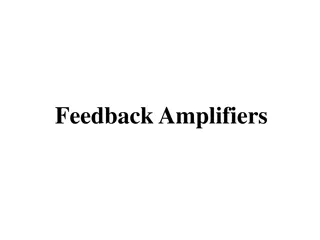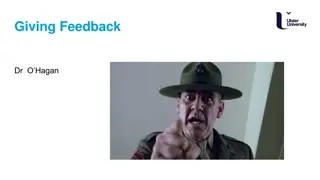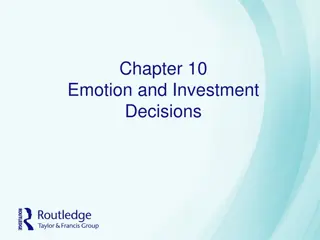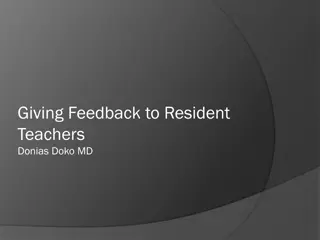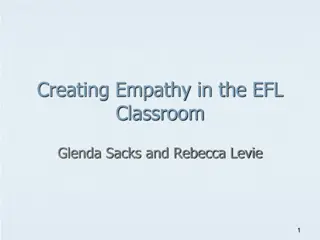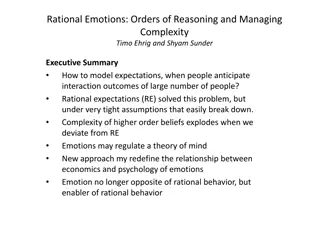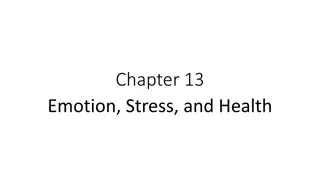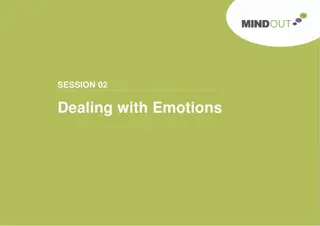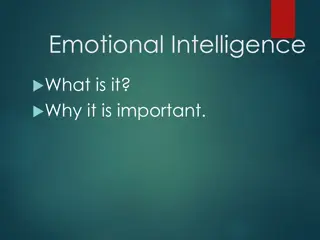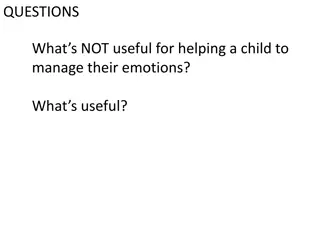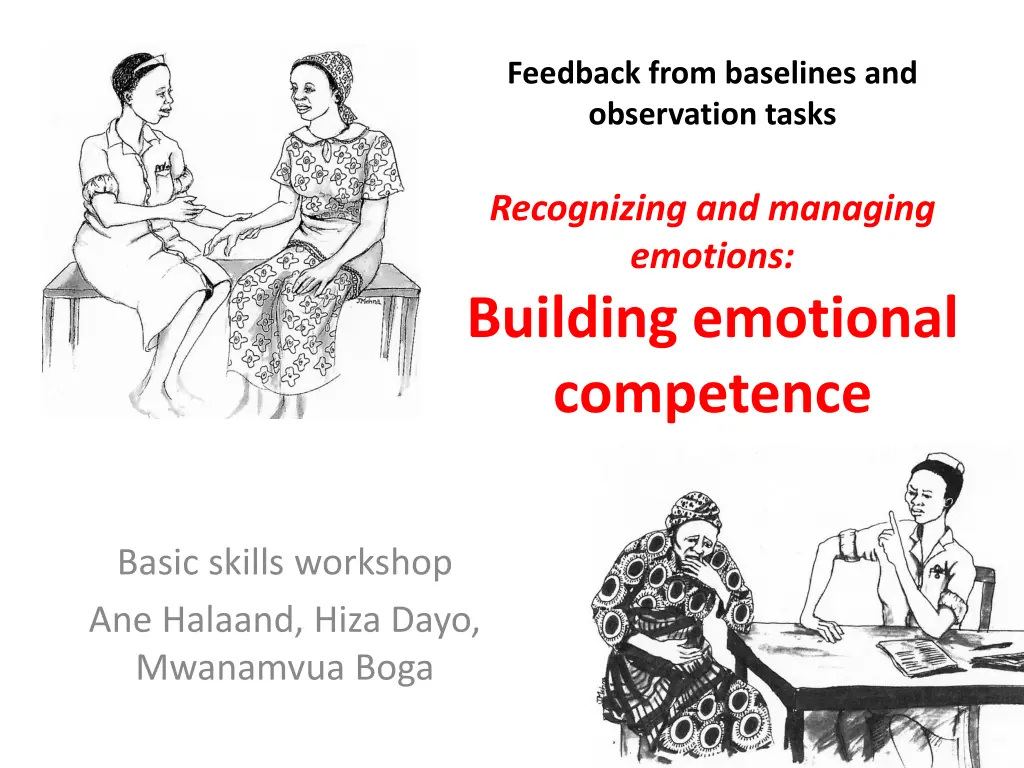
Effective Communication and Emotional Management Workshop Insights
Explore insights from the workshop on recognizing and managing emotions, building emotional competence, and developing basic skills. Topics covered include communicating with respect, reactions to respect and disrespect, and controlling automatic responses. Gain valuable knowledge to enhance emotional intelligence and communication skills.
Download Presentation

Please find below an Image/Link to download the presentation.
The content on the website is provided AS IS for your information and personal use only. It may not be sold, licensed, or shared on other websites without obtaining consent from the author. If you encounter any issues during the download, it is possible that the publisher has removed the file from their server.
You are allowed to download the files provided on this website for personal or commercial use, subject to the condition that they are used lawfully. All files are the property of their respective owners.
The content on the website is provided AS IS for your information and personal use only. It may not be sold, licensed, or shared on other websites without obtaining consent from the author.
E N D
Presentation Transcript
Feedback from baselines and observation tasks Recognizing and managing emotions: Building emotional competence Basic skills workshop Ane Halaand, Hiza Dayo, Mwanamvua Boga
Contents 1. Effects of communicating with and without respect 2. Feeling safe, or insecure, and effects on communication 3. Ways of handling conflict 4. What makes patients scared/angry 5. What makes patients open up 6. Insights: Handling emotions
How do you communicate with a person whom you respect? I communicate with respect -25 (listen attentively/humbly/politely/calmly/use good tone) I communicate with low tone, respectful and humble myself When communicating with a person I respect, I use words and language which portrays respect
How do you react when you are treated with respect? Feel good and appreciated/honored - 20 I feel good and I pay more attention to the subject Feel good and want to reciprocate to others -3 I feel good and honored and show respect also to the person who respects me Raises self esteem -2 I feel good, appreciated and a high sense of self-esteem
How do you react when you are not respected? Pull back reactions: 12 (Withdrawn/Lack confidence/ Demoralized/Dishonored) I feel someone has degraded me, despised me and feel really bad I feel much lowered and not honored Act out reactions: 6 (Frustrated/Angry/Complain/ Bad/Sorry ) I feel angry, hot tempered; I can be rude, full of emotions
Are these reactions automatic or do you control them? Automatic -17 There was a time we had a patient being nursed in the ward and he had very bad septic wounds and he had refused to being dressed for 5 days so I got angry and told him that he is going to die of the bad wounds. Control 7 I try to control the reactions once in amenity ward a relative left a very sick patient who could not do anything to self. At night the patient fell and injured his head. The relative was so cruel to me. I had to explain that I was all alone hence there was nothing I could have done hence I was sorry.
2. Feeling safe, or insecure? Effects on communication
In what situations do you feel safe? When respected/understood/valued/appreciated 9 I feel safe when one recognizes my effort and when none intimidate me When I am trusted, and given positive feedback Environment is conducive: No challenges, caring, friendly people 9 When people around are friendly and kind Others When confident with what I am doing/Doing the right thing - 2
How do you communicate when you feel safe ? Freely/with no fear/with confidence 20 I communicate freely with all my heart and mind when feeling happy to express my views Listen/Open to give and receive information 3 I tend to listen to patients or others carefully so as to get what they want me to do for them. I communicate well/humble/calm 6 I communicate well and humble
In which situations do you feel insecure or afraid when taking care of patients? Handling very sick/dying /psychiatric patients - 12 When the general condition is very poor and I know no matter how much we try this particular patient will eventually die When working on very sick children who are helpless I feel so sad for the child and this drains me all the energy Handling Stubborn/Disrespectful/angry patients or caretakers - 4 When the parents/guardians of the child are very anxious, stubborn When a patient comes to me at the first contact and very furious and not seem not to appreciate/value what I am doing When in doubt - 3 When what I am delivering might not be what they are expecting or when I am not certain of the results I am giving my patients
How do you communicate when you feel insecure or afraid? Communicate with fear/very cautiously/hold back information 11 Cautious, with restrictions, to avoid offending I communicate in a rude way/with no respect 7 Negative and rude. When if I feel insecure or afraid it makes me feel like a police officer It demoralizes me and I attend to patients with no respect Lose confidence/use others -4 I tend to loose my confidence. It affects me personally because one feels guilty of the bad or poor services rendered Others Communicate very fast/start blaming- 3
How do you behave when you are Overwhelmed? Fearful? Sorrowful? Angry? Angry Act out: 16 (irritable , shout at people, become destructive) When I am angry I tend to be bitter, raise my tone of voice to people and at time release my anger to the wrong people Pull back : 6 (walk away, keep quiet and reflect, repress the anger) I become very calm, being afraid of worsening the situation with my work Overwhelmed Act out: 4 (shout/blame others, get emotional outbursts) I feel I need some attention and sometime shift blames, a patient died while a decision to give intravenous fluids was delayed Pull back: 3 (don t listen, loose interest, talk briefly, delegate) Fearful Pull back - 6 (engage in group talk, address the cause) I choose to stay in a group that is talking of something not related to the issue causing fear. I go for music to provide direction of the issues causing fear.
3. Handling conflict Confronting? ... Or evading?
How do you handle conflict? Confront - 8 To date when there is conflict I try to ensure the other party cools down then later confront to find where the problem is or address the problem. One day my wife was annoyed and started exchanging harsh words I went out of the house then came later when she was breast feeding and we talked calmly till we solved the case Evade/Leave to others to take initiative 9 In cases of conflict, I usually like keeping off as I fear arguments Act as mediators 11 Allow the two parties to cool down first, find out where the problem was, find a solution of which each one could know their weak and strong points after understanding that they come to an agreement and forgive each other and start afresh
What would you like to learn to handle conflict? The majority (24) felt their way of handling conflict was not effective in reaching their goal. They want to learn: How to handle conflict with care How to effectively deal with my emotions when handling conflict (anger, fear.) Improve on my communication skills Effective strategies or techniques to handle conflicts
What makes patients angry? Delays or poor service delivery 15 Mainly delays in service delivery and sarcastic/abusive language by health care providers When disrespected/Ignored/Shouted at - 6 Disrespecting or shouting at them, leaving them unattended Issues about sample taking (drawing blood/LP etc) 2 Some investigations that needs bleeding of children i.e. bleeding to remove blood Inadequate information/no feedback 2
How do you handle an angry patient/parent? Using communication skills and emotional support 23 In the above situation at first the parent had a lot of fear since the whole night she had had no sleep since the baby was sick and did not sleep and so she came early for her child to be attended. I welcomed the mother calmed her down by showing respect and understanding of her situation assisted her by examining the baby then explained to her the importance of cleaning and morning preparations Not able to handle angry patient 3 A father who was harsh and abused me because his child died, I tried to cool him down but instead he became more furious and I also became angry and told him off
How did you feel about your efforts to calm down the angry patient/parent? Those who managed to calm patients - 21 Felt good/ happy/satisfied/sense of achievement or accomplishment/efforts fruitful I felt good and satisfied, after all the client was calm and got the service Those who did not manage to calm patients - 3 Felt frustrated/bad 3 A difficult situation which frustrated me very much Worked up/tensed and bored -2
5. What makes patients open up and give information?
What makes patients open up and give you the information you need, without fear? Patients open up when valued, treated in a friendly manner/ respected/appreciated/listened to and shown empathy 16 Trust and being valued is the key to gathering information from clients, this is achieved by giving a warm welcome and showing concern What will make patients to open up and give you information you need is when one is friendly, warm and kind to them making them to trust you and feel that you are concerned about them When assured of confidentiality/privacy ensured - 8 Reassurance and assuring confidentiality of the information given. Active listening to the patient. These usually allay fear of any kind and can make patient open up
Insights: Managing anger Anger causes anxiety, headaches and even high blood pressure that threaten our health. Anger can trigger fights and abuse. With the reflection and observation I am made to understand anger affects our day to day life negatively more so in health provision. Well managed anger can be useful at work, social places and at home. This has motivated me to make a positive change. To control my anger I have learnt to recognize and accept emotion as part of life. I believe every problem has a remedy to control it rather than uncontrolled anger It doesn t matter how hurt we are. Approaching the other person in a calm manner and with respect can help solve the problem. We should stop thinking of the person who irritates us and focus on way forward to solving the problem. We always need change immediately when angered but it s good to have self control otherwise the end could be destructive
Insights: Managing anger (2) Surely anger can be automatic as defensive mechanism, but I ve been made to understand that it can be controlled. At times I could become mad with everything that upsets me, but now I have realized that my negative impact on the other party hence leading to not achieving/gaining any better solution to a problem I have learned dealing with irritation and anger is very interesting. The small and big situations which bring irritations/anger and later conflicts are normal and are daily issues of our today s life, but how one handles them matters a lot. Irritations and anger can spoil ones entire life when handled without understanding and can also bring a positive solution when handled with understanding. This is great
Insights: Blame does not solve it I discovered that even if you blame, it doesn t reverse the situation. I have come to realize that big reactions are never helpful and do not solve problems promptly as if one takes too long to calm down after a reaction, time is wasted and the problem grows larger and larger. And sometimes when one tries to solve a problem before the tempers are over I have realized that no solutions are achieved because temperature or grief is still high and it might cause a danger to self or whoever is assisted.
Insights: I am part of the conflict! I have discovered that I am part of the conflicts which arise from the way I react to questions and comments which come my way. Also how people behave towards me. My judge is too quick at bringing out from my mind the negative side of the situation or statements the always wondered why people react badly towards me and I ve now got the answer. Am too cautious with the statements. I now need to digest the message, read inner meaning, then think of the answer and the repercussions of what I want to say and do before deliver my actions or statements I have observed that am susceptible to anger. I don t digest and analyze the information or reaction first before I make a comment or conclude my next step of action
Conclusion Have we captured the main issues?



